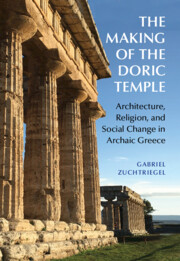Chapter Six - Conclusions
Published online by Cambridge University Press: 22 July 2023
Summary
The concluding chapter contextualizes the study of ancient Doric architecture against the backdrop of European colonialism and modern globalization. The evolutionary explanation of the Doric temple can be seen as part of a broader tendency in the West of naturalizing and normalizing Greek/Western culture as world culture by tracing it back to universal principles. The critique of the evolutionary narrative makes it possible to appreciate the disruptive and innovative character of the Doric order as part of a historical shift in the wielding of religious and political power and in the relation between Greek communities and the landscapes they inhabited. Population growth, social change, and political innovation led to urbanization, colonization, and land reclamation on an unprecedented scale. These processes challenged the traditional religious system, which was based on an intrinsic relation between the divinities and the natural features of the landscape. The Doric temple can be seen as a response to this situation: by redefining the sacred space, “inhabited” by the gods, it also redefined what was outside the sacred precinct, the “profane” land that was subject to new forms of exploitation, land distribution, and colonization.
Keywords
- Type
- Chapter
- Information
- The Making of the Doric TempleArchitecture, Religion, and Social Change in Archaic Greece, pp. 222 - 230Publisher: Cambridge University PressPrint publication year: 2023

